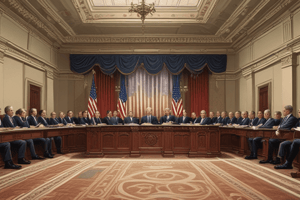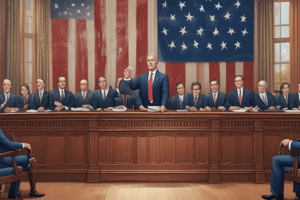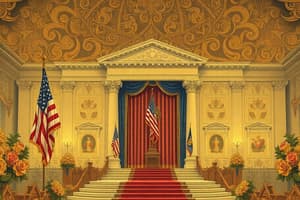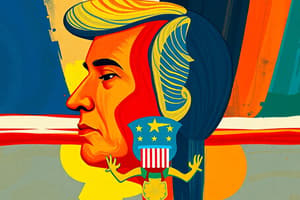Podcast
Questions and Answers
What is the primary responsibility of the Secretary of Labor?
What is the primary responsibility of the Secretary of Labor?
- Handle regulations for energy sources
- Manage transportation safety across modes
- Ensure fair wages and working conditions for workers (correct)
- Oversee military benefits and services
Which department is responsible for providing services to military veterans?
Which department is responsible for providing services to military veterans?
- Department of Labor
- Department of Veterans Affairs (correct)
- Department of Education
- Department of Homeland Security
What is the main distinction between enforcement and regulation in government agencies?
What is the main distinction between enforcement and regulation in government agencies?
- Regulation sets rules for law implementation, whereas enforcement ensures adherence to those rules. (correct)
- Enforcement includes writing laws, while regulation is about compliance.
- Enforcement focuses solely on punishing violations of the law, while regulation is about education.
- Regulation involves compliance checks, while enforcement is about establishing laws.
Which of the following is NOT a method by which the United States can go to war?
Which of the following is NOT a method by which the United States can go to war?
What role does the Secretary of Health and Human Services play in the government?
What role does the Secretary of Health and Human Services play in the government?
Which body holds the constitutional power to declare war?
Which body holds the constitutional power to declare war?
What is the primary role of the Secretary of State?
What is the primary role of the Secretary of State?
How has the use of congressional war-making powers evolved over time?
How has the use of congressional war-making powers evolved over time?
Who is the head of the Department of Justice?
Who is the head of the Department of Justice?
Which department focuses on creating strong communities and affordable housing?
Which department focuses on creating strong communities and affordable housing?
Independent agencies are different from executive branch agencies because they are primarily?
Independent agencies are different from executive branch agencies because they are primarily?
Which department is responsible for supervising trade and promoting U.S. business interests?
Which department is responsible for supervising trade and promoting U.S. business interests?
What does the Secretary of Defense primarily manage?
What does the Secretary of Defense primarily manage?
The Department of Agriculture primarily focuses on which of the following?
The Department of Agriculture primarily focuses on which of the following?
Which of the following agencies is part of the Department of Justice?
Which of the following agencies is part of the Department of Justice?
How are the members of independent agencies typically appointed?
How are the members of independent agencies typically appointed?
What is one function of the executive branch regarding judicial appointments?
What is one function of the executive branch regarding judicial appointments?
What distinguishes departments from independent agencies within the executive branch?
What distinguishes departments from independent agencies within the executive branch?
Which of the following best describes the purpose of executive orders?
Which of the following best describes the purpose of executive orders?
Which situation exemplifies the President's use of executive privilege?
Which situation exemplifies the President's use of executive privilege?
How does the concept of crisis management relate to FEMA?
How does the concept of crisis management relate to FEMA?
Which of the following is true about executive agreements?
Which of the following is true about executive agreements?
What role do the executive branch departments play?
What role do the executive branch departments play?
Which of the following is NOT a power of the president related to pardons?
Which of the following is NOT a power of the president related to pardons?
Flashcards
Department of Labor Secretary's role
Department of Labor Secretary's role
Ensures fair wages and working conditions for workers.
Department of Transportation Secretary's role
Department of Transportation Secretary's role
Manages highway safety and air, rail, and sea travel.
Regulation vs. Enforcement
Regulation vs. Enforcement
Regulations are laws, while enforcement is ensuring they are followed. Enforcement includes monitoring and taking action against violations.
War-making powers (Congress)
War-making powers (Congress)
Signup and view all the flashcards
Force Authorization
Force Authorization
Signup and view all the flashcards
Ways the US goes to war
Ways the US goes to war
Signup and view all the flashcards
Department of Energy role
Department of Energy role
Signup and view all the flashcards
Department of Education role
Department of Education role
Signup and view all the flashcards
Presidential Appointments
Presidential Appointments
Signup and view all the flashcards
Pardons and Reprieves
Pardons and Reprieves
Signup and view all the flashcards
Executive Order
Executive Order
Signup and view all the flashcards
Executive Agreement
Executive Agreement
Signup and view all the flashcards
Executive Privilege
Executive Privilege
Signup and view all the flashcards
Signing Statement
Signing Statement
Signup and view all the flashcards
Department vs. Independent Agency
Department vs. Independent Agency
Signup and view all the flashcards
Size and Scope of the Executive Branch
Size and Scope of the Executive Branch
Signup and view all the flashcards
Executive Branch Departments
Executive Branch Departments
Signup and view all the flashcards
Independent Agencies
Independent Agencies
Signup and view all the flashcards
President's Cabinet
President's Cabinet
Signup and view all the flashcards
Secretary of State
Secretary of State
Signup and view all the flashcards
Secretary of Treasury
Secretary of Treasury
Signup and view all the flashcards
Secretary of Defense
Secretary of Defense
Signup and view all the flashcards
Attorney General
Attorney General
Signup and view all the flashcards
Departments' Roles
Departments' Roles
Signup and view all the flashcards
Study Notes
US Government - Executive/Legislative Branch and Media Bias
- Roles of the President:
- Textbook pages 242-244
- Chief of state (ceremonial duties)
- Chief of executive (head of government, enforces laws, appoints officials)
- Chief diplomat (foreign relations)
- Commander-in-chief (military)
- Chief policy maker (proposes legislation, signs bills, vetoes)
- Chief of the party (leader of political party)
- Chief manager of the economy (monitors economy)
Powers of the President (Chapter 13)
- Review formal/informal powers from slide show
- Executive orders (discussed in slide show)
- Commander-in-Chief: Commands US armed forces; direct military operations, deploy troops, make strategic decisions; constrained by Congress’s war declaration/funding powers.
- Veto Power: President can veto legislation passed by Congress; has 10 days to sign or veto a bill; 2/3 of Congress can override a veto; if bill is not signed within 10 days it becomes law (only if Congress is in session).
- Treaty-Making: President can negotiate and sign treaties with foreign nations, some require Senate (⅔) approval, some do not.
- State of the Union Address: Required by Constitution to inform Congress and recommend legislation; addresses the condition of the state; offers ideas on solving national problems; recommends new legislation.
- Calling Congress into Special Session: If a pressing issue arises, President can call Congress into special session.
Executive Branch Bureaucracy
- Textbook pages 246-248
- Understand the general size and scope of the executive branch
- President
- Departments underneath
- Departments differ from independent agencies
- Department heads are part of president’s Cabinet
- Independent agencies are not managed by the president
- Departments are the main organization in the executive branch (15 departments)
Departments and Agencies
- Education, transportation, defense, energy, etc.
- Smaller agencies perform different jobs
- DOJ (Justice Dept) – operates justice system/FBI/DEA
- Independent Agencies – independent of the president, address specific issues.
- Controlled by a board of commissioners (less presidential influence).
- President’s cabinet are appointed secretaries to lead each department; offer advice.
War-making powers
- Review video notes (links on canvas).
- Four ways US can go to war: Declaration of war, treaty, statute, sudden attack.
- Which branch holds the power to declare war?
- Congress
- Force authorizations: -Joint resolutions from Congress (e.g. September 18, 2001 authorizing use of US armed forces against those responsible for September 11 terrorist attacks).
Legislative Branch Structure
- Bicameral: two houses (House of Representatives, Senate)
- Each house limits the power of the other
- House of Representatives:
- 435 members (proportional to population)
- Minimum of 1 member per state
- 2-year terms (supposed to adjust to current needs, always hanging)
- Senate
- 100 members, 2 per state
- 6-year terms (looking towards the future)
Legislative Powers
- Primary function of legislative branch: makes laws; declares war, regulates interstate commerce, controls taxing/spending policies.
- House powers (exclusively):
- Impeachment
- Initiate revenue bills
- Election of President (tie case)
- Senate powers (exclusively):
- Hold impeachment trials
- Ratify treaties
- Confirmation powers (confirming presidential appointments).
- 17th amendment: changed how senators are elected (direct election by the people)
- How does impeachment work? (House starts, Senate conducts the trial).
- How does a bill become a law?
- Steps after Congress approval, steps if president approves, steps if congress overrides the veto
Media Bias and Gerrymandering
- Methods and criticisms of gerrymandering
- Gerrymandering: the redrawing of voting lines to favor a certain party.
- Criticisms: packing/cracking.
- When is gerrymandering legal vs. illegal?
- Packing: concentrate a majority of opposing party members into a few districts to minimize the amount of districts they can win.
- Cracking: Dividing one political party up into several different districts to lessen their chances of winning any one of them.
Studying That Suits You
Use AI to generate personalized quizzes and flashcards to suit your learning preferences.
Related Documents
Description
Explore the roles and powers of the President of the United States, focusing on their formal and informal powers as outlined in Chapter 13. This quiz covers key responsibilities, including their duties as Commander-in-Chief and their legislative authority. Test your understanding of media bias in relation to the executive and legislative branches.




